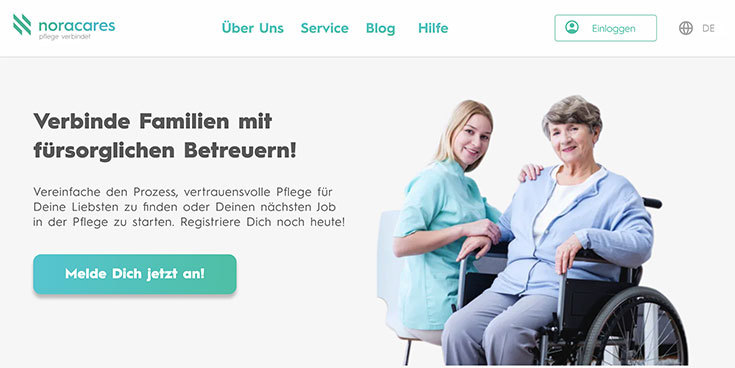Care ABC - Q for Quality Standards
Search the best 24-hour care for you or your loved ones? Then you should read this article! How do you find out whether 24-hour care is really top quality? We reveal the secret of the quality standards.
Imagine you are looking for the perfect care for a loved one. Someone who provides loving support day after day, ensures safety and always has a sympathetic ear. But how do you find out whether the care is really good? The answer lies in one crucial point: quality standards.
Quality standards are like the invisible net that holds everything together. They give you the security of knowing that your relative is in the best hands, whether it's 24-hour care or hourly care. But what exactly is behind these standards and how can you ensure that they are implemented in your home? In our blog article, we take a look at the Care quality and give you tips for implementing it in your own four walls.
Quality standards in care are like an invisible scaffold that supports and protects care for people in need of care. They provide a clear framework that ensures that every person who needs support receives it in a dignified and professional environment. These standards range from physical care and emotional support to Communication with relatives and are the result of legal requirements and best practice. They should be reviewed regularly to ensure that they meet the changing needs of society.
In care, quality standards are at the heart of a trusting relationship between the caregiver and the person in need of care. Some of the most important guidelines are:
- Continuity of care: A trusted carer who is there for the person day and night creates a sense of safety and security.
- Individual care plans:Every person is unique, and care should be tailored to individual needs, like sewing a bespoke suit.
- Patient and family member orientation: Caregivers should always include the perspective of the person in need of care and their relatives. Involving the family in decision-making processes and taking their wishes and needs into account are crucial for high-quality care.
- Punctuality and reliability: Since time is limited, it is important that caregivers always show up reliably and on time - just like a good friend who is never late.
- Flexibility: Caregivers should be able to respond quickly to the changing needs of the person being cared for, like a skilled dancer who effortlessly adapts to the music.
- Documentation of care measures: Even with hourly care, a detailed Documentation essential to ensure that everything goes well and that the quality of care is guaranteed.
- Caregiver training and continuing education: Regular training is crucial to ensure that nurses are informed about the latest findings and techniques. This not only improves the quality of care, but also increases families' confidence in the skills of caregivers.
- Compliance with hygiene standards: Hygiene is a key aspect of care, especially to prevent infection and illness. Care facilities must follow strict hygiene guidelines and provide regular infection control training.
- Interdisciplinary collaboration: Close cooperation between different disciplines (doctors, therapists, social workers) is important in order to ensure comprehensive and holistic care. This promotes the exchange of information and ensures that all aspects of care are taken into account.
Quality standards are therefore not just a theoretical concept, but the supporting pillars on which safety and well-being in care are based. They give you the reassuring feeling that your relative is in the best hands and that you can rely on the professionalism of the nursing staff.
The implementation of quality standards in care is like the interaction of a well-rehearsed orchestra in which every musician plays an important role. Quality and expectation management are essential here. Quality management ensures that all care staff work harmoniously towards common goals. Care facilities rely on regular training and audits to ensure that everyone involved is aware of and complies with the defined standards. These continuous improvement processes are like a fine-tuning process that constantly raises the quality of care to a new level. This ensures that every measure and every interaction with the people in need of care meets the highest standards.
Expectation management, on the other hand, is the key to transparent and open communication between caregivers and families. This communication works like a well-coordinated conversation in which both sides can clearly articulate their needs and wishes. Regular meetings and conversations are essential to ensure that families' expectations are met and that caregivers have the information they need to provide the best possible care. By listening to relatives and taking their feedback seriously, caregivers create a basis of trust that not only improves the quality of care, but also promotes the well-being of everyone involved. In this harmonious collaboration, care becomes a shared responsibility that lays the foundation for respectful and high-quality care.
Tips for families to check the quality of care
Checking the quality of care at home is like monitoring a precious garden, which can only flourish magnificently if it is tended regularly. There are some simple but effective ways for families to ensure their loved one's care is flourishing. Here are some practical tips that can help you check the quality of care:
- Regular visits: Take the time to regularly check in on your or your loved one. Pay attention to changes in well-being and mood.
- Conversations: Talk openly with the person in need of care about their experience with the caregiver. Ask if they feel comfortable and if their needs are being met.
- Note observations: Determine how the caregiver treats your or your loved one. Look for kindness, patience and empathy in their interactions.
- Get information: Talk to other family members or friends who have also had experiences with caregivers. Recommendations can provide valuable insights.
- Feedback from caregivers: ask the caregiver about their observations and challenges. Open communication promotes a better understanding of the situation.
Checklists are valuable tools for maintaining an overview and searching for the right criteria. Careful selection of nursing staff should be like putting together the best ingredients for a delicious dish. Look for care certificates that confirm that the caregivers have the necessary qualifications, as well as reviews and recommendations from other families. Make a list of questions you would like to ask potential caregivers, such as their experience and approach to caregiving. Criteria such as empathy, communication skills and flexibility are just as important as professional qualifications. By using this checklist, you turn yourself into a skilled gardener who ensures that every flower - every moment of care - is treated with love and expertise.
In nursing, the pursuit of high quality is often like a mountain hike that doesn't just go straight ahead. Along the way, caregivers and family members often encounter typical challenges that can seem like steep slopes or unexpected obstacles. One of the most common problems is communication: misunderstandings between caregivers and families can lead to needs not being properly understood or met. The pressure placed on caregivers can also lead to overwork and a decline in the quality of care.
However, as with any hike, there are solutions that make the path easier. Regular feedback meetings are like a map that points the way. When relatives and caregivers talk openly about their experiences and expectations, misunderstandings can be cleared up and common goals can be set. These conversations create a bridge of understanding and promote respectful cooperation.
Another suggestion for quality improvement is the continuous training of nursing staff. Much like a hiker who regularly checks and updates their equipment, caregivers need to stay informed about the latest care techniques and approaches. Regular training and workshops help to keep knowledge fresh and increase motivation, which has a direct positive impact on the quality of care.
In addition, clear documentation of care services can serve as a navigation system to maintain an overview and ensure the quality of care. In this way, every challenge is not just seen as an obstacle, but as an opportunity for further development. By working together to improve the quality of care, caregivers and family members create a harmonious environment in which both the person in need of care and the caregiver can thrive.
noracares is like a trustworthy lighthouse that guides families safely through the often stormy seas of care. The platform not only illuminates the path to suitable caregivers, but also ensures that the quality of care is always at the center of attention.noracares' support starts with the careful selection of caregivers. Like an experienced gardener who selects only the best seeds for his garden, noracares only provides certified and experienced caregivers. Each caregiver is screened according to strict quality criteria so that families can be sure that their loved ones are in good hands.
Specifically suggests suitable nursing staff for the respective needs. To make it easier to select the right caregiver, you can get to know candidates better in advance by email and video call. This allows the language level, skills and mutual liking to be clarified in advance.
The Advantages of Platform lie in the customized mediation. noracares acts as a clever guide, helping families to find exactly the caregiver that best suits their individual needs. Whether for 24-hour care or hourly support - the platform ensures that the caregivers are not only professionally competent, but also the right choice on a personal level. At the same time, noracares offers continuous support. Families can rely on the network at all times and benefit from the transparent system, which makes both care certificates and caregiver ratings visible. In this way, noracares becomes a bridge between people in need of care and highly qualified carers who work hand in hand to ensure the highest quality of care.
Caring for a loved one is like weaving an invisible but powerful web. Every stitch stands for love, care and the highest standards that make everyday life safe and secure for you and your loved ones. Quality standards in care are the firm knots that keep this net stable - they guarantee that nothing slips through and that your loved ones always receive the best care. Together with noracares you succeed in weaving this web without much difficulty, so that only the most qualified and experienced caregivers come to you and your family's home. It is a network that connects, supports and provides security, even in the most turbulent times. So you know that your loved ones are in the best hands, supported by a strong, invisible network of trust and quality.
Register with noracares and find the perfect caregiver, that meets the highest quality standards and supports your family!
.







